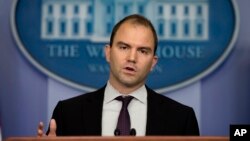WHITE HOUSE —
White House officials say U.S. President Barack Obama spent several weeks deciding whether to send military aid to Syrian opposition groups, and that it will take time for the supplies to reach them. The president will discuss the issue with allies at the G8 summit in Northern Ireland next week.
Deputy National Security Adviser Ben Rhodes said the president’s decision will dramatically increase U.S. support for Syria’s opposition forces. He told reporters Friday that Obama was influenced by the mounting evidence that Syrian President Bashar al-Assad's government is using chemical weapons, and by rising involvement from outside groups.
“Those are decisions that he has made over the course of the last several weeks, particularly as our assessment of chemical weapons use firmed up, and as we saw a deteriorating situation in general, with outside actors like Iran and Hezbollah getting involved. So this has been a steady increase for us,” said Rhodes.
Rhodes said the United States has been working for about six months to build relationships with opposition groups Washington sees as moderate, such as the Syrian Opposition Coalition and the Supreme Military Council. He said those efforts will help guard against U.S. weapons falling into the hands of extremists.
“That is important, because it both allows you to get assistance into the hands of those who need it, but it also allows you to have protections to try to keep assistance from reaching those who we do not want to receive materiel, for instance, al-Nusra, which has generally been the most extremist element of the opposition,” said Rhodes.
About 93,000 people have been reported killed in the Syrian conflict. U.S. intelligence estimates that about 100 to 150 of them were killed by chemical weapons, and the White House says the use of those weapons violates international norms.
Rhodes said Obama will discuss the U.S. response to Syria with allies at the Group of Eight summit, which starts Monday in Northern Ireland.
Russia is the only G8 member that supports the Assad government, which could lead to a contentious discussion when Obama meets separately Monday with Russian President Vladimir Putin.
Rhodes said Obama will try to convince the Russian leader that supporting Assad is not in his country’s interests.
“They do not want to see a downward spiral. They do not want to see a chaotic and unstable situation in the region. They do not want to see extremist elements gaining a foothold in this area. And the point that we have made to Russia is that the current course, in which Assad is not being appropriately pressured to step down from power by those who continue to support him in the international community, is bringing about those very outcomes,” he said.
Rhodes said Obama and Putin are expected to find common ground on Afghanistan, counterterrorism and other issues.
After the G8 summit, Obama will travel to Berlin to meet with German Chancellor Angela Merkel and speak at the Brandenburg Gate.
Deputy National Security Adviser Ben Rhodes said the president’s decision will dramatically increase U.S. support for Syria’s opposition forces. He told reporters Friday that Obama was influenced by the mounting evidence that Syrian President Bashar al-Assad's government is using chemical weapons, and by rising involvement from outside groups.
“Those are decisions that he has made over the course of the last several weeks, particularly as our assessment of chemical weapons use firmed up, and as we saw a deteriorating situation in general, with outside actors like Iran and Hezbollah getting involved. So this has been a steady increase for us,” said Rhodes.
Rhodes said the United States has been working for about six months to build relationships with opposition groups Washington sees as moderate, such as the Syrian Opposition Coalition and the Supreme Military Council. He said those efforts will help guard against U.S. weapons falling into the hands of extremists.
“That is important, because it both allows you to get assistance into the hands of those who need it, but it also allows you to have protections to try to keep assistance from reaching those who we do not want to receive materiel, for instance, al-Nusra, which has generally been the most extremist element of the opposition,” said Rhodes.
About 93,000 people have been reported killed in the Syrian conflict. U.S. intelligence estimates that about 100 to 150 of them were killed by chemical weapons, and the White House says the use of those weapons violates international norms.
Rhodes said Obama will discuss the U.S. response to Syria with allies at the Group of Eight summit, which starts Monday in Northern Ireland.
Russia is the only G8 member that supports the Assad government, which could lead to a contentious discussion when Obama meets separately Monday with Russian President Vladimir Putin.
Rhodes said Obama will try to convince the Russian leader that supporting Assad is not in his country’s interests.
“They do not want to see a downward spiral. They do not want to see a chaotic and unstable situation in the region. They do not want to see extremist elements gaining a foothold in this area. And the point that we have made to Russia is that the current course, in which Assad is not being appropriately pressured to step down from power by those who continue to support him in the international community, is bringing about those very outcomes,” he said.
Rhodes said Obama and Putin are expected to find common ground on Afghanistan, counterterrorism and other issues.
After the G8 summit, Obama will travel to Berlin to meet with German Chancellor Angela Merkel and speak at the Brandenburg Gate.




